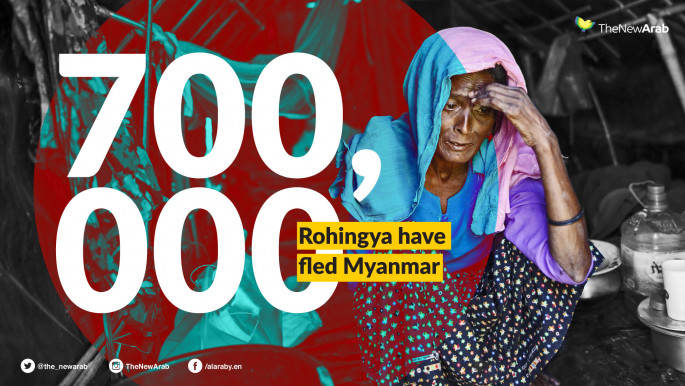UN calls for 'proper' probe into Myanmar massacres
Some 700,000 Rohingya Muslims have fled over the border to Bangladesh since August to escape a bloody military crackdown that has left a trail of torched villages in its wake as refugees allege murder and rape by Myanmar's armed forces.
During a two-day trip to Myanmar, a UN Security Council envoy travelled to Rakhine province - home to most of Myanmar's Rohingya Muslim minority - and met both civilian leader Aung San Suu Kyi and Senior General Min Aung Hlaing, who heads an army accused by the UN of "ethnic cleansing."
"In order to have accountability there must be a proper investigation," the UK's UN ambassador Karen Pierce told reporters, after envoys had visited the Rohingya refugee camps in Bangladesh and also Rakhine.
There were two ways to establish a full probe, "one is an ICC (International Criminal Court) referral", she said. The other was for Myanmar's government to hold its own comprehensive inquiry.
Myanmar's army chief denied the allegations against his forces.
"The Tatmadaw (army) is always disciplined... and takes action against anyone who breaks the law," he told the delegates, according to a posting late Monday on his official Facebook page.
Leading international rights group Human Rights Watch called on Friday for the Rohingya crisis to be referred to the International Criminal Court (ICC).
"The lack of a UN Security Council resolution has left the Myanmar government convinced that it has literally gotten away with mass murder," HRW executive director Kenneth Roth told reporters in Yangon.
Scenes of dispossessed Rohingya fleeing en-masse as their villages in Rakhine State burn behind them have provoked outrage around the world.
Myanmar's authorities have continued to deny the growing documentation.
In September, the Rakhine state border security minister rejected the reports saying: "Where is the proof? Look at those women who are making these claims - would anyone want to rape them?"
An internal investigation conducted by the military was released late last year, clearing themselves over the reported Rohingya atrocities, and was described as 'white-washing' by human rights groups.
In the past, Suu Kyi has defended the military operation, and authorities claim the security crackdown was in response to attacks by Rohingya militants on police posts.
Yanghee Lee, a UN special envoy on human rights described Myanmar's violent military operations as bearing, "the hallmarks of a genocide."
The UN and other rights groups have warned that a mass repatriation of Rohingya would be premature, as Myanmar has yet to address the systematic legal discrimination and persecution the minority has faced for decades.
Bangladesh and Myanmar vowed to begin repatriation in January, but the plan has been repeatedly delayed as both sides blame the other for a lack of preparation. More than 8,000 refugees are waiting for repatriations according to a list compiled by Bangladesh.
Bangladesh accuses Myanmar of trying to buy time by pretending to cooperate over repatriation for the benefit of the international community.
The Rohingya have faced discrimination for decades in Buddhist-majority Myanmar where they are denied citizenship and denigrated as illegal 'Bengali' immigrants.

![rohingya [getty] rohingya [getty]](/sites/default/files/styles/large_16_9/public/media/images/1C6A8526-ECFA-4876-97AD-1C91E27574A0.jpg?h=d1cb525d&itok=3u-szJ7u)


![General Abdel Fattah Burhan overthrew Prime Minister Abdulla Hamdok's government last week [Getty]](/sites/default/files/styles/image_330x185/public/2021-11/GettyImages-1236140770.jpg?h=903dff9f&itok=m-elSNNn)